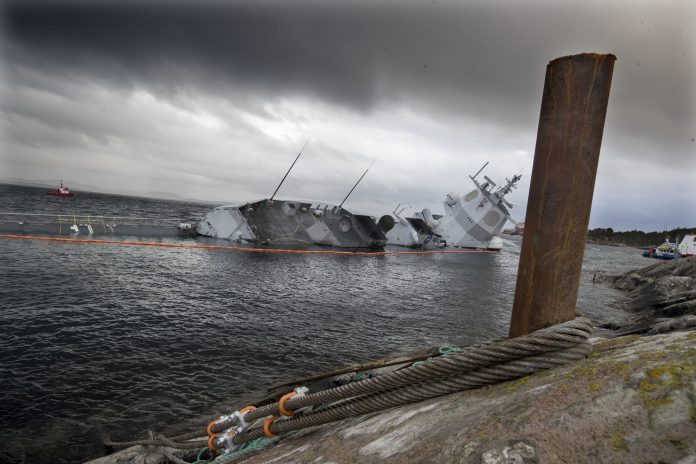
Kjetil Rolness thinks that what he labels a «therapeutic culture» has invaded all parts of society, including the Defence Forces. In a contribution on Facebook, the social debater and sociologist writes that a debate regarding cause and effect is subordinate to emotional and psychological aspects.
The contribution is written in connection with the discussion on KNM Helge Ingstad, one of the Marine’s frigates that recently sailed straight into a tanker in the Hjelte fiord outside Bergen.
To begin with, Rolness makes it a point that it seems incredible that nobody knows what happened when a complete crew utilising advanced technology that even warned them, navigated straight into a tanker.
– It is certainly well that somebody knew what happened when a duty officer, his assistant, a helmsman, and two lo0kouts, despite having access to advanced navigation gear and several urgent warnings the minutes before the crash, did not realise that they were on the verge of colliding with a tanker of 140.000 ton and probably should altered course, Rolness writes, pointing to a remark from the Chief of the Marine that «only the psychologists and the priests know what happened».
Rolness further writes that the leaders of the Defence Forces complain of speculations. He thinks that they insist on defending the crew on board KNM Helge Ingstad. According to the Norwegian newspaper, Klassekampen, the crew receives elaborate trauma treatment; a whole team encompassing doctors, psychologists, nurses, and priests will care for them.
– In the meantime, the Defence Forces complain of speculations in the public, tell us how incredibly great, clever, and well trained the crew is and comfort us that the mental observation is good as gold, he writes.
Among other things, Rolness mentions that the Norwegian newspaper, Verdens Gang, has reported that the crew will now be together, work together, and sleep together, in some kind of trauma treatment.
– I anticipate that we will have the first «What did you feel then» interview with parts of the crew on guard on the bridge in Lørdagsrevyen, before we get to know anything about the reasons for the accident, he writes.
Rolness concludes that a therapeutic culture is spreading throughout society. This culture leads to a subordination of causes and effects and consequences to please emotional aspects. In spite of the fact, according to Rolness, that it is politically incorrect to speculate, he questions what the therapeutic culture does to the Norwegian ability of defence.
– The therapeutic culture invades all parts of society, now even the area in which it belongs the very least. Any talk about causes, actions, responsibility, and effects are subordinate to the thematication of the «human»; that is, the emotional and psychological aspects, preferably viewed as victims. If we had been ordered not to speculate, we might well began wondering what this does to the ability to defend ourselves. Let it not be war; that will really hurt, Rolness writes.
Translated to English by Lars Hoem

